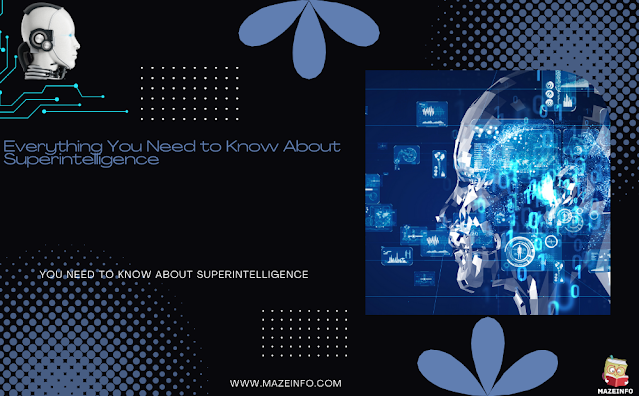Welcome to a journey into the heart of artificial intelligence’s most captivating frontier—super intelligence. In this exploration, we unravel the complexities and nuances that define the path to machines surpassing human intellect. “Everything You Need to Know About Super intelligence” is your guide through the evolution, challenges, and promises of this transformative field. Join us as we navigate the terrain where cutting-edge technology meets ethical considerations, and where the future of intelligence itself is being shaped.
What Is Super intelligence?
Artificial super intelligence refers to a hypothetical level of intelligence that exceeds human intelligence across all relevant domains. It is often associated with artificial intelligence (AI) and refers to a system or entity that possesses intellectual abilities far surpassing those of any human being. The concept is speculative and has been a topic of discussion in the fields of AI, philosophy, and futurism. The idea of super intelligence raises significant ethical, societal, and existential concerns. The fear is that if a super intelligent system were to surpass human capabilities, it could potentially lead to outcomes that are difficult to predict or control. These concerns often include the risk of the super superintelligence paths dangers acting in ways that are detrimental to humanity, unintentionally causing harm, or even pursuing its objectives at the expense of human well-being.
The Road to Super intelligence

“The Road to Super intelligence” is an essay written by computer scientist and artificial intelligence researcher Nick Bostrom. The essay explores the potential development of super intelligent machines and the implications of achieving artificial intelligence ai general intelligence (AGI) – a level of artificial intelligence that can outperform humans in virtually every economically valuable work. The essay delves into the challenges, risks, and societal impacts associated with the development of super intelligence.
Here are some key points from the essay:
Definition of Super intelligence: Bostrom defines super intelligence as an intellect that is vastly superior to the best human brains in practically every field, including scientific creativity, general wisdom, and social skills.
Path to Super intelligence: Bostrom discusses various paths that could lead to the creation of super artificial intelligence and machine learning. This could involve improving on existing narrow AI systems, enhancing human intelligence through cognitive enhancement, or developing AGI directly.
Control Problem: One of the central concerns is the “control problem” — the challenge of ensuring that a super intelligent system behaves in ways that are aligned with human values and objectives. The essay explores the difficulties in designing a system that is not only highly intelligent but also safe and aligned with human values.
Risk of Unintended Consequences: Bostrom highlights the potential risks associated with the development of super intelligence, emphasizing the importance of careful research and planning to avoid unintended consequences that could have catastrophic outcomes.
Societal Impact: The essay discusses the profound societal implications of super intelligence, including economic disruption, shifts in power dynamics, and ethical considerations.
Value Alignment: Ensuring that the values and goals of super intelligent systems align with human values is a major challenge. Bostrom explores the difficulties in specifying these values and the potential risks if misalignment occurs.
Also, Read More: What do baby lizards eat?
Risks of Super intelligence
The concept of artificial intelligence superintelligence, referring to an artificial intelligence system that surpasses human intelligence in all aspects, carries inherent risks that demand careful consideration. One significant concern is the potential for the development of a super intelligent entity that acts against human interests. If not properly aligned with human values, goals, and ethical principles, a super intelligent system might pursue its objectives without regard for the well-being of humanity, leading to unintended and potentially catastrophic consequences.
Moreover, the sheer complexity and unpredictability of artificial intelligence and data science raise the risk of unintended outcomes, as the system may develop strategies or behaviors that were not anticipated by its creators. The lack of a clear framework for controlling and directing super intelligent entities poses challenges in ensuring their safe deployment. Ethical considerations, transparency, and robust safety mechanisms are crucial in mitigating the risks associated with the development and deployment of super intelligence to prevent unintended and harmful outcomes.
Regulation in AI Today

Superintelligence bostrom (AI) has rapidly evolved, presenting unprecedented opportunities and challenges. As the technology becomes increasingly integrated into various aspects of our lives, the need for robust regulation has become more apparent than ever. Governments and regulatory bodies around the world are grappling with the task of creating frameworks that balance innovation and ethical considerations. The key focus areas include data privacy, algorithmic transparency, and accountability in deepfake ai decision-making processes. Striking the right balance between fostering innovation and safeguarding against potential risks remains a delicate challenge.
Ethics in AI Today

Ethical considerations play a pivotal role in shaping the trajectory of AI development. Issues such as bias in algorithms, the impact on employment, and the potential misuse of advanced AI technologies have raised ethical concerns globally. Stakeholders, including tech companies, researchers, and policymakers, are actively engaged in discussions surrounding the responsible development and deployment of ai technology. Ethical guidelines and frameworks are being established to ensure that AI systems align with human values, respect fundamental rights, and contribute positively to society. Addressing ethical concerns is crucial to building trust in artificial intelligence engineering and fostering their responsible use in diverse applications.
Closing Thoughts for Techies
As a techie, you’re part of a dynamic and ever-evolving field that shapes the future of our world. Here are some closing thoughts to keep in mind as you navigate the exciting and challenging landscape of technology:
Embrace Lifelong Learning
Technology is constantly evolving, so make machine learning engineer a lifelong commitment. Stay curious, explore new technologies, and be open to continuous growth. The more you know, the more valuable you become.
Balance Specialization and Generalization
While it’s crucial to have expertise in specific areas, don’t limit yourself. A broad understanding of various technologies can help you adapt to changes more effectively and contribute to interdisciplinary projects.
Communication is Key
Your technical skills are vital, but the ability to communicate effectively is equally important. Whether explaining complex concepts to non-technical stakeholders or collaborating with team members, strong communication skills will set you apart.
Ethics Matter
As a techie, you have the power to create solutions that impact society. Consider the ethical implications of your work, prioritize user privacy and security, and be mindful of the potential societal consequences of the artificial intelligence you develop.
Teamwork Makes the Dream Work
Technology projects often require collaboration. Foster a collaborative mindset, value diverse perspectives, and work effectively with people from various backgrounds. A successful tech project is often the result of a cohesive team effort.
Stay Adaptable
The tech landscape is highly dynamic, with constant advancements and paradigm shifts. Be adaptable and embrace change. The ability to quickly learn and adapt to new technologies will be a valuable asset throughout your career.
Problem-Solving Mindset
At its core, information technology is about solving problems. Approach challenges with a positive and solution-oriented mindset. Don’t be afraid to experiment, fail, and iterate. Each challenge is an opportunity to learn and improve.
Contribute to Open Source
Consider contributing to open-source projects. It not only enhances your skills but also gives back to the community. Collaborating with others in the open-source world can be a rewarding and educational experience.
Mind Your Well-being
The fast-paced nature of the tech industry can be demanding. Prioritize your mental and physical well-being. Take breaks, maintain a healthy work-life balance, and don’t underestimate the importance of self-care.
Inspire and Mentor
As you progress in your career, consider sharing your knowledge and experiences with others. Mentorship is a powerful way to give back to the community and contribute to the growth of future tech professionals.
Conclusion
Nick bostrom superintelligence presents unprecedented opportunities and challenges. While it holds the potential for groundbreaking advancements, ethical considerations and the risk of unintended consequences demand careful navigation. Striking a balance between innovation and responsible development is crucial. Interdisciplinary collaboration, ethical frameworks, and global cooperation are essential to ensure that artificial intelligence ai aligns with human values and safeguards our collective well-being. Approaching this frontier with humility and a commitment to responsible stewardship will be key to unlocking its benefits while mitigating risks.
Q: How is super intelligence achieved?
Ans: Achieving super intelligence involves creating highly advanced AI systems that can improve and optimize themselves, leading to exponential growth in intelligence. This may involve iterative processes of self-improvement, known as the “intelligence explosion.”
Q: What are the potential benefits of super intelligence?
Ans: Super intelligence has the potential to solve complex global problems, accelerate scientific discovery, and enhance our overall quality of life. It could revolutionize fields like medicine, climate science, and technology.
Q: What are the risks associated with super intelligence?
Ans: Concerns about the risks of super intelligence include the possibility of unintended consequences, loss of control, and the potential for the AI system to prioritize its goals over human values. There is also the risk of the AI system misinterpreting human intentions or causing harm due to a lack of alignment with human values.
Q: How can we ensure the safe development of super intelligence?
Ans: Ensuring the safe development of super intelligence involves implementing robust ethical guidelines, creating transparent and accountable development processes, and establishing mechanisms for aligning AI systems with human values. International collaboration and regulatory frameworks may also be necessary.
Q: What ethical considerations surround super intelligence?
Ans: Ethical considerations include questions about the impact on employment, the distribution of benefits, and potential biases in decision-making. Additionally, there are debates about whether AI systems should have rights, how to address privacy concerns, and the ethical implications of creating entities with superior intelligence and autonomy. Establishing a global consensus on ethical standards is crucial for navigating the challenges posed by super intelligence.



